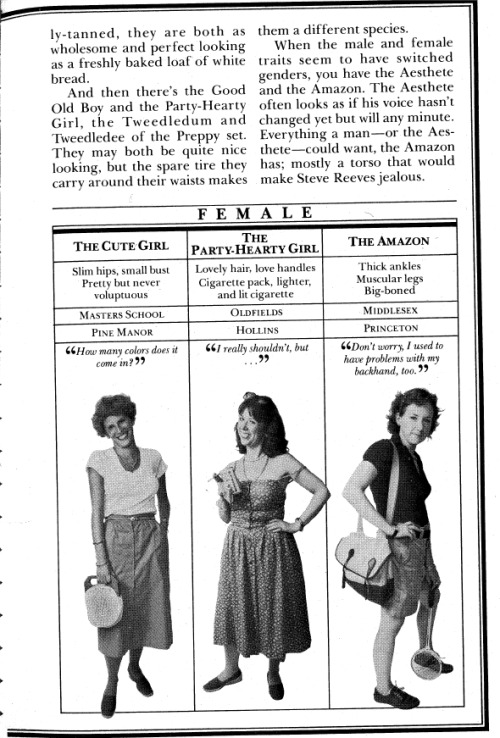The Yuppie Handbook 1984 Sparknotes
Something is occurring in Chicago. Some 20,000 new dwelling units have been built within two miles of the Loop over the past ten years to accommodate the rising tide of “Yuppies'—young urban professionals rebelling against the stodgy suburban lifestyles of their parents. The Yuppies seek neither comfort nor security, but stimulation, and they can find that only in the densest sections of the city.Dan Rottenberg (1980)The first printed appearance of the word was in a May 1980 magazine article. Rottenberg reported in 2015 that he didn't invent the term, he had heard other people using it, and at the time he understood it as a rather neutral demographic term. Nonetheless, his article did note the issues of socioeconomic displacement which might occur as a result of the rise of this inner-city population cohort. Was credited for coining the term in 1982, although this is contested.
The term gained currency in the United States in 1983 when syndicated newspaper columnist published a story about a business networking group founded in 1982 by the former radical leader, formerly of the (whose members were called '); Greene said he had heard people at the networking group (which met at to soft classical music) joke that Rubin had 'gone from being a yippie to being a yuppie'. The headline of Greene's story was 'From Yippie to Yuppie'. Humorist Alice Kahn claimed to have coined the word in a 1983 column.
This claim is disputed.The proliferation of the word was affected by the publication of The Yuppie Handbook in January 1983 (a take on ), followed by Senator 's 1984 candidacy as a 'yuppie candidate' for President of the United States. The term was then used to describe a political demographic group of but voters favoring his candidacy. Magazine declared 1984 'The Year of the Yuppie', characterizing the salary range, occupations, and politics of 'yuppies' as 'demographically hazy'. The alternative acronym yumpie, for young upwardly mobile professional, was also current in the 1980s but failed to catch on.In a 1985 issue of, Theressa Kersten at described a 'yuppie backlash' by people who fit the demographic profile yet express resentment of the label: 'You're talking about a class of people who put off having families so they can make payments on the. To be a Yuppie is to be a loathsome undesirable creature'.
Leo Shapiro, a in Chicago, responded, ' always winds up being derogatory. It doesn't matter whether you are trying to advertise to farmers, or Yuppies, no one likes to be neatly lumped into some group.' The word lost most of its political connotations and, particularly after the, gained the negative socio-economic connotations that it sports today. On April 8, 1991, magazine proclaimed the death of the 'yuppie' in a mock.The term has experienced a resurgence in usage during the 2000s and 2010s. In October 2000, remarked in a article that – due to his extreme wealth, cosmopolitanism, and adventurous social life – is 'Our Founding Yuppie'. A recent article in Details proclaimed 'The Return of the Yuppie', stating that 'the yuppie of 1986 and the yuppie of 2006 are so similar as to be indistinguishable' and that 'the yup' is 'a shape-shifter. He finds ways to reenter the American psyche.'
In 2010, right-wing political commentator wrote in very critically of 'yuppies'. Usage outside the United States 'Yuppie' was in common use in Britain from the early 1980s onward (the ) and by 1987 had spawned subsidiary terms used in newspapers such as 'yuppiedom', 'yuppification', 'yuppify' and 'yuppie-bashing'.A September 2010 article in described the items on a typical Hong Kong resident's 'yuppie wish list' based on a survey of 28- to 35-year-olds. About 58% wanted to own their own home, 40% wanted to, and 28% wanted to become a boss. A September 2010 article in The New York Times defined as a hallmark of Russian 'yuppie life' adoption of and other elements of such as their, and furniture. See also.References. Algeo, John (1991).
Fifty Years Among the New Words: A Dictionary of Neologisms. Cambridge University Press. P. 220. Childs, Peter; Storry, Mike, eds. 'Acronym Groups'. Encyclopedia of Contemporary British Culture. London: Routledge.
Retrieved May 20, 2016. Seemann, Luke.
Chicago. Rottenberg, Dan (May 1980). P. 154ff. Ayto, John (2006). Movers And Shakers: A Chronology of Words That Shaped Our Age. Oxford University Press.

P. 128. Budd, Leslie; Whimster, Sam (1992). Global Finance and Urban Living: A Study of Metropolitan Change. P. 316. Hadden-Guest, Anthony (1997). The Last Party: Studio 54, Disco, and the Culture of the Night.
New York: William Morrow. 116. Clarence Petersen.

(March 28, 1986). Chicago Tribune. Retrieved April 22, 2013. Jorge, Trendy (June 21, 2006). Retrieved April 22, 2013.
Sparknotes 1984 Chapter 2
January 9, 1984. Retrieved February 4, 2016. ^ Burnett, John; Alan Bush. 'Profiling the Yuppies'. Journal of Advertising Research. 26 (2): 27–35.
Moore, Jonathan (1986). Campaign for President: The Managers Look at '84. March 26, 1984. Retrieved February 4, 2016. Shapiro, Walter (April 8, 1991). Retrieved April 28, 2007.
(October 23, 2000). The Weekly Standard. Retrieved August 21, 2010.
Gordinier, Jeff. Retrieved August 15, 2010.
(August 13, 2010). National Review. Retrieved August 16, 2010. Algeo, John; Algeo, Adele S. (July 30, 1993), Fifty Years Among the New Words: A Dictionary of Neologisms 1941–1991, Cambridge University Press, p.,.

Wong, Natalie (September 8, 2010). Kishkovsky, Sophia (September 14, 2010). The New York Times.Further reading. Lowy, Richard (June 1991). 'Yuppie Racism: Race Relations in the 1980s'.
Beverly Hills, CA: Sage Publications. 21 (4): 445–464.External links The dictionary definition of at Wiktionary.